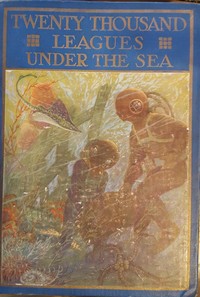A few weeks ago I decided to download and re-read Jules Verne’s “20,000 Leagues under the sea” on my kindle. When I was done I was a bit surprised to learn that the version which I had finished is actually pretty shit. Although re-reading the blurb with a cynic’s eye, you can see that Amazon sort of know that as well…
20,000 leagues was originally published in French as a serial between 1869 and 1870. Around 1872 Lewis Page Mercier got the job of translating it and some of Verne’s other books onto English. He could speak French. But in hindsight his other main qualification was that he could do the job fast. He translated all three in one year.
What was overlooked, or not noticed, was that he wasn’t up to speed on the technical terms used in the books e.g. he literally translated the French for diving suits as “cork-jackets”. As a proud Englishman he made sure to colour the translations with his political views – one of Captain Nemo’s heroes was Daniel O’Connell, but mention of this was cut entirely from the book. And it appears that one of the ways you can get through that many translations so fast, is you just leave out 1/4 of the book!
What is really odd is that none of this was noticed for over 90 years. Mercier’s shonky translations were the standard for a long time. It was only in the 1960s when new translation of 20,000 leagues appeared that Mercier’s were dethroned. The translation errors were fixed, and the missing text restored. The new translators also fixed the most glaring error – the title. Even with my school French I can see that the book’s correct name is “20,000 leagues under the seas“.

Once upon a time a there was a bad translation, but now we have better ones. So what? Well the problem is that Mercier’s text is out of copyright. Which means it can be freely copied, re-printed, and shared. And so it refuses to die. Amazon’s free, (4.3/5 star), kindle version of the book is based on Mercier’s translation.
Fortunately you have options. One of the well regarded modern translations is by Fredrick Paul Walter from 1991. He has made it available in the public domain. You can get it for free in loads of (electronic) formats from these links:


I had never really considered the quality of my translations before. And it sort of adds a hidden cost to the “free” out of copyright books. You need to find out who has translated the classic you are reading. Check if is any good. And if not try and find a better version. Or for masochists you can learn the language the book originally was written in!
And personally, I also had to go onto Amazon and give a low rating to their version 🙂

Last thing, why did I decide to read this book now? Because of a board game! One of the many lists of board-games-to-play-during-the-pandemic mentioned “Nemo’s War“. Its a (mostly) solo game which really gets into the spirit of the book.
Well I think it does. I read Mercier’s translation so now I need to go and read a good one instead!
This is awesome because I’m currently on exactly the same journey as you! I have been playing Nemo’s War and got interested in the original story. I started reading a copy and realized the language was weird so I’ve been digging into the different translations. I found one that I like which is older than the one you mentioned and also better than the original.
Was Dr. Tom Brunetti of City University of New York involved in any of the translations of 20,000?
I have to say I don’t know. My information is wikipedia and 2 other websites I found when I was looking at this way back when.